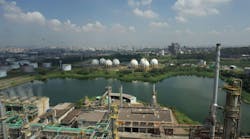Kuwait's oil minister, Ali Khalifah al-Sabah, one of the most accomplished performers in the world of the Organization of Petroleum Exporting Countries, is moving on to become his country's minister of finance.
OPEC will get its first official view of Ali's successor, Raschid Salim al-Ameeri, at the ministerial conference scheduled to open July 25 in Geneva.
The high level change in the oil ministry, part of a general cabinet reshuffle, is unlikely to be the forerunner of any major change in Kuwait's oil policy. However, there certainly will be a change in presentation.
Ali not only has a command of his subject resulting from almost 12 years in office, he is one of that much needed breed in OPEC: a minister who could present policies to the outside world.
THE NEW MINISTER
Ameeri, 39, is a chemical engineer turned academic. His only experience in formulating Kuwaiti oil policy comes from a 3 year membership of the Supreme Petroleum Council starting in 1987.
The new minister was educated at the University of Wisconsin, where he obtained a BS degree in chemical engineering. He then went on to Penn State University, where he earned a master's degree and a doctorate in the same subject.
After working as a process engineer with Kuwait Oil Co., he joined the Kuwait Institute for Scientific Research, then became associate professor of chemical engineering at Kuwait University and head of the chemical engineering department.
As oil minister, Ameeri also will head Kuwait Petroleum Corp., which under Ali's leadership pioneered downstream ventures in consuming countries. That has enabled the state company's international unit to become a significant force in European refining and marketing.
With the backbone of the international network in place, Ameeri will have the task of expanding the operation in Europe and building a more influential position among fast growing economies of the Pacific Rim.
The advanced state of downstream integration will provide the minister with his first taste of conflict in OPEC. The need to supply the European network with crude and meet demands of its domestic refining complex has turned Kuwait into one of OPEC's more blatant quota breakers.
THE PRODUCTION ISSUE
Unless there is a sudden cut in Kuwait production to meet the 1.5 million b/d level agreed on at the ministerial meeting last May, Ameeri could find his first encounter with other OPEC ministers quite acerbic once the traditional welcome is over.
The high level of Kuwaiti production, currently estimated at about 1.7 million b/d, is one of the reasons for a visit to the Persian Gulf by OPEC Pres. Sadek Boussena, Algeria's oil minister. He is bearing the message that crude prices face further declines unless the most flagrant breaches of the May production deal are ended.
OPEC production in the first 3 weeks of June showed a small decline from May's 23.7 million b/d. But the decline was not enough to stabilize prices or deflect the impatience of other big Persian Gulf producers-Iran, Iraq, and Saudi Arabia-with production policies of Kuwait and the United Arab Emirates.
Copyright 1990 Oil & Gas Journal. All Rights Reserved.

